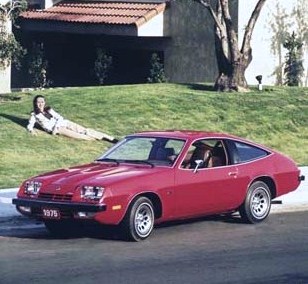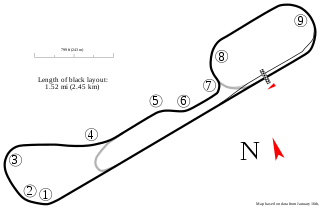Related Research Articles

The Chevrolet Monza is a subcompact automobile produced by Chevrolet for the 1975 through 1980 model years. The Monza is based on the Chevrolet Vega, sharing its wheelbase, width, and standard inline-four engine. The car was designed to accommodate the GM-Wankel rotary engine, but due to mediocre fuel economy and emissions-compliance issues the engine was cancelled, and a V8 engine option was substituted. The Monza name has also been used for several other cars.

Allan Maxwell Grice, known to motor-racing fans as "Gricey", is an Australian former racing driver and politician, most famous for twice winning the prestigious Bathurst 1000, and as a privateer driver of a Holden in the Australian Touring Car Championship.
The National Series for Sports Sedans, formerly the Australian Sports Sedan Championship, is a CAMS sanctioned national motor racing title for drivers of cars complying with Australian Sports Sedan regulations. This class, essentially a silhouette racing car class, caters for cars of essentially free construction but utilising some of the bodywork of a closed, series production vehicle.
The 1991 Australian Touring Car Championship was a CAMS sanctioned motor racing title open to Group 3A Touring Cars. The title, which was the 32nd Australian Touring Car Championship, was contested over a nine-round series which began on 24 February 1991 at Sandown Raceway and ended on 11 August at Oran Park Raceway, The series was promoted as the Shell Australian Touring Car Championship and was won by Jim Richards driving a Nissan Skyline GT-R.
The 1983 Australian GT Championship was a CAMS sanctioned Australian motor racing title for cars complying with Group D regulations for GT cars, with Group B Sports Sedans competing by invitation. It was the sixth Australian GT Championship. The championship was won by Rusty French, driving a Porsche 935.
The 1984 Australian GT Championship was an CAMS sanctioned Australian motor racing title and was the seventh Australian GT Championship to be awarded. It was a series open to grand tourer cars complying with CAMS Group D regulations with Group B Sports Sedans competing by invitation. The series was contested over six rounds from 15 April to 9 September 1984.

The Australian GT Championship is a CAMS-sanctioned national title for drivers of GT cars, held annually from 1960 to 1963, from 1982 to 1985 and from 2005. Each championship up to and including the 1963 title was contested over a single race and those after that year over a series of races. The categories which have contested the championship have not always been well defined and often have become a home for cars orphaned by category collapse or a sudden change in regulation.
The 1989 Australian Touring Car Championship was a CAMS sanctioned Australian motor racing title open to Group 3A Touring Cars. The championship, which was the 30th Australian Touring Car Championship, began on 5 March at Amaroo Park and ended on 9 July at Oran Park Raceway after eight rounds. The 1989 Australian Manufacturers' Championship was contested over the same eight round series.
The 1981 Australian Sports Sedan Championship was an Australian motor racing competition for Group B Sports Sedans. It was sanctioned by the Confederation of Australian Motor Sport and was the sixth Australian Sports Sedan Championship.

The Adelaide International Raceway is a permanent circuit owned by Australian Motorsport Club Limited under the auspices of the Bob Jane Corporation. The circuit is located 26 km north of Adelaide in South Australia on Port Wakefield Road at Virginia, and is adjacent to Adelaide's premier car racing Dirt track racing venue, Speedway City. AIR is owned by the Bob Jane Corporation and run by the Australian Motorsport Club Ltd.
The 1984 Australian Touring Car Championship was a CAMS sanctioned Australian motor racing title for Group C Touring Cars. It was the 25th running of the Australian Touring Car Championship, and the last to be contested by Group C cars as new regulations, based on international Group A, were introduced for 1985. The championship, which began on 18 February 1984 at Sandown Raceway and ended on 1 July at Adelaide International Raceway after seven rounds, was won by Dick Johnson driving a Ford XE Falcon.
The 1985 Australian Touring Car Championship was a CAMS sanctioned motor racing title for drivers of Touring Cars. It was the 26th running of the Australian Touring Car Championship and the first to be contested using regulations based on the FIA's International Group A regulations after having been run under CAMS home grown Group C rules between 1973 and 1984. The championship began on 10 February 1985 at Winton Motor Raceway and ended on 14 July at Oran Park Raceway after ten rounds.
The 1972 Australian Touring Car Championship was a CAMS sanctioned national motor racing title open to Improved Production Touring Cars and Group E Series Production Touring Cars. The championship, which was the 13th running of the Australian Touring Car Championship, began at Symmons Plains and ended at Oran Park after eight rounds.
The 2004 Australian Nations Cup Championship was an Australian motor racing competition for modified production-based coupes complying with "Nations Cup" regulations. Contested as part of the 2004 Procar Championship Series, it was sanctioned by the Confederation of Australian Motor Sport as a National Championship with PROCAR Australia Pty Ltd appointed as the Category Manager.

The 1979 Australian Sports Sedan Championship was a CAMS sanctioned Australian motor racing title for drivers of Group B Sports Sedans. It was the fourth Australian Sports Sedan Championship.
The 1979 Australian Sports Car Championship was a CAMS sanctioned motor racing title for drivers of Group D Production Sports Cars. It was the eleventh Australian Sports Car Championship and the fourth to be restricted to cars complying with Group D regulations.
The Romano WE84 is an Australian designed and built, mid-engined closed top racing car built to CAMS Group A Sports Car specifications. The car began its life as the Kaditcha K583 when it first appeared in the 1983 Australian Sports Car Championship and was built by the Queensland based Kaditcha owner and former McLaren engineer Barry Lock after he was approached by Brisbane accountant, property developer, timber mill owner and former speedway racer Bap Romano in 1981 with the idea of building a Le Mans type coupe. When the car first appeared in 1983, it was the first closed top Sports Car seen in Australia and looked like an FIA Group C Sports Car rather than the open cockpit Can-Am style cars of previous years. This led to the false belief that it was built to the Group C regulations
The 2012 Australian GT Championship was a CAMS sanctioned national motor racing championship open to GT style closed production based sports cars which were either approved by the FIA for GT3 competition or approved by CAMS as Australian GTs.
AMSCAR was a touring car series held in Australia between 1979 and 1997, based at Amaroo Park in Sydney.

The Veskanda C1 is a one-off, Australian designed and built, mid-engined closed top racing car built in 1985 to CAMS Group A Sports Car specifications. Powered by a Chevrolet V8 engine, the car is generally regarded as the fastest sports car ever built in Australia and as of 2016 remains one of Australia's fastest race cars.
References
- 1 2 3 Australian Titles, docs.cams.com.au, as archived at www.webcitation.org on 16 July 2014
- 1 2 3 4 5 6 7 8 Barry Catford, Australian GT /Sports Sedan Championship, Australian Motor Racing Yearbook, 1982/83, pages 168–187
- 1 2 3 Conditions for Australian Titles, 1982 CAMS Manual of Motor Sport, pages 87–91
- 1 2 Points for each driver have been calculated by applying the referenced points system to the top six drivers at each round, as recorded in Australian Motor Racing Year, 1982/83
- 1 2 3 4 5 6 7 Official Souvenir Programme, Adelaide International Raceway, Sunday, 4th July 1982
- ↑ The 1982 CAMS Manual states that eight of nine rounds would count but final points listings in Australian Motor Racing Yearbook 1982/83, page 168 and Racing Car News, November 1982, page 22 both show Jones with a season total of 81 points
- 1 2 3 4 List of Entries, Symmons Plains, 18 September 1982, oldmotorsportphotos.com.au Retrieved 15 February 2020
- ↑ Official Programme, Calder, Sunday, 1st Aug. 1982